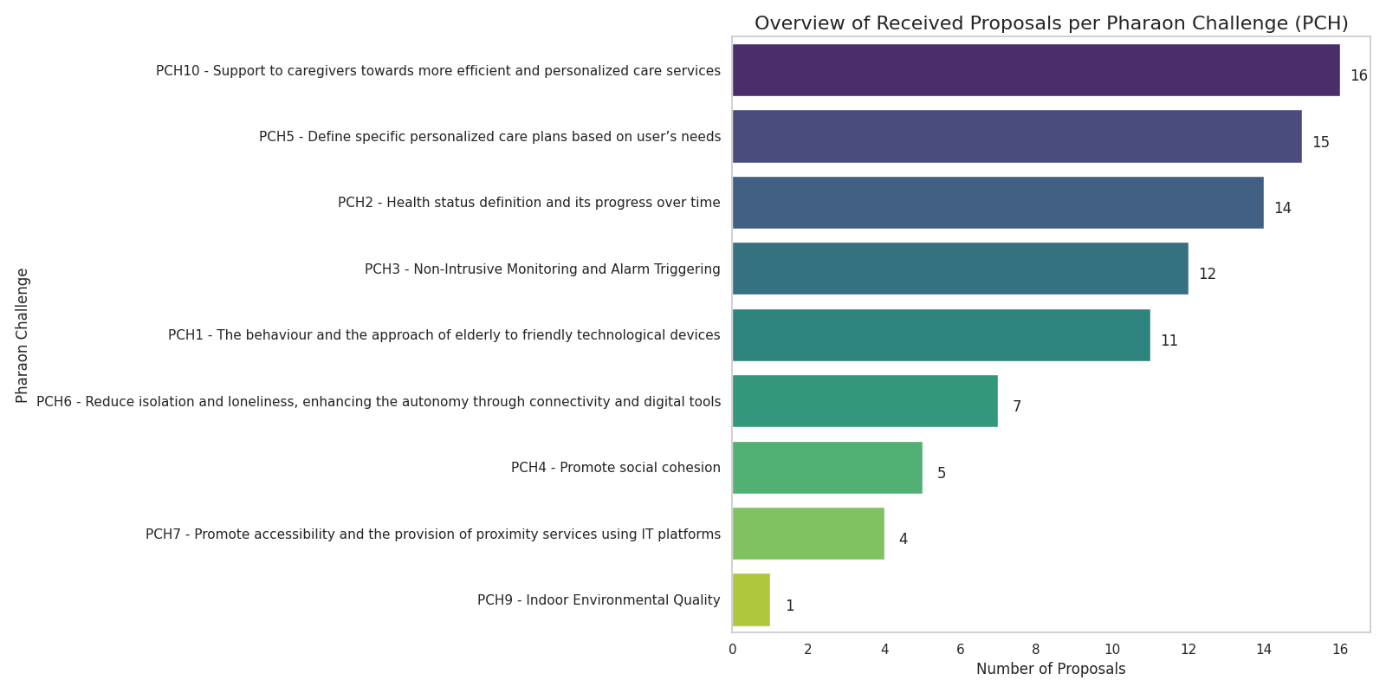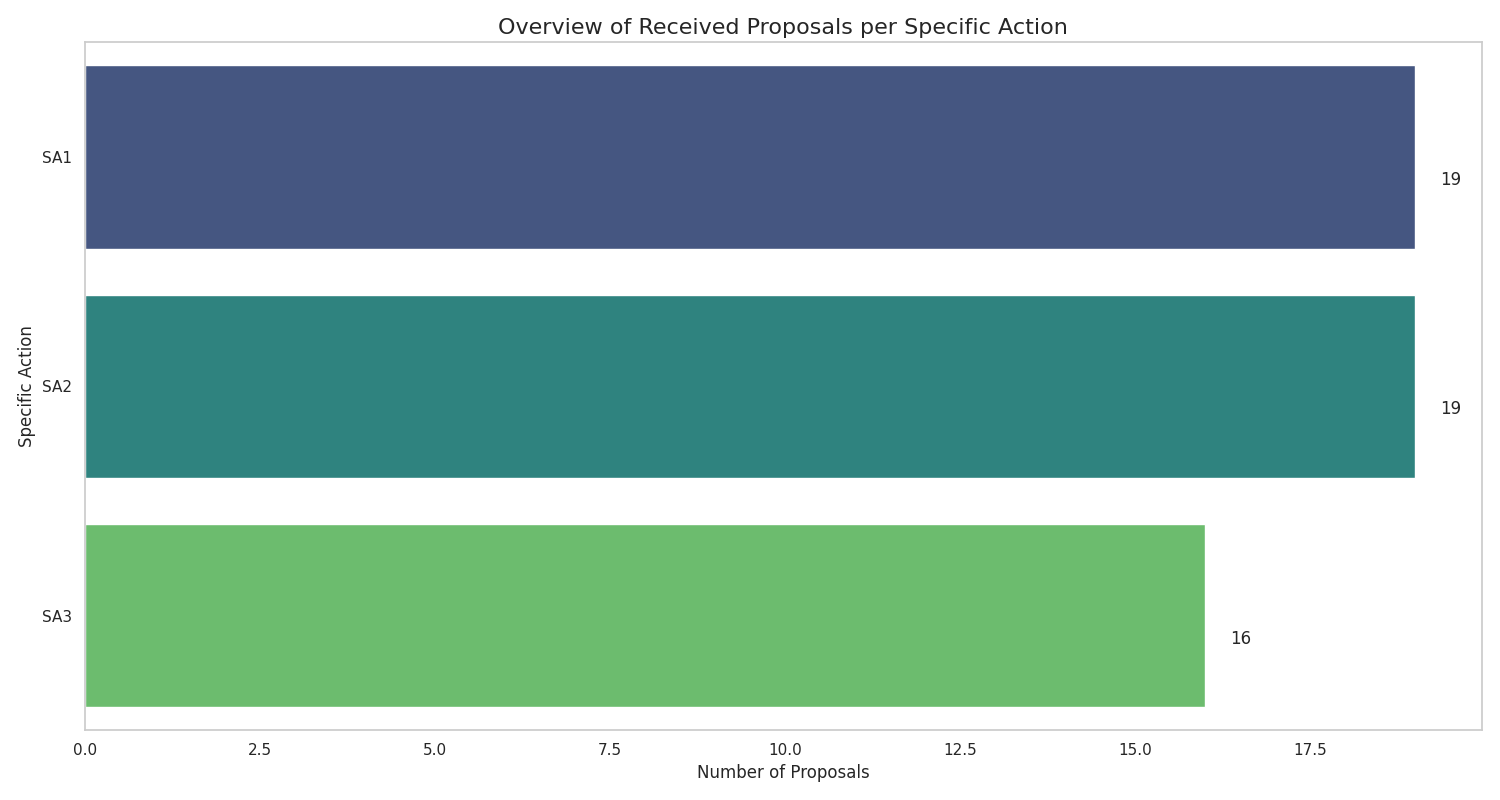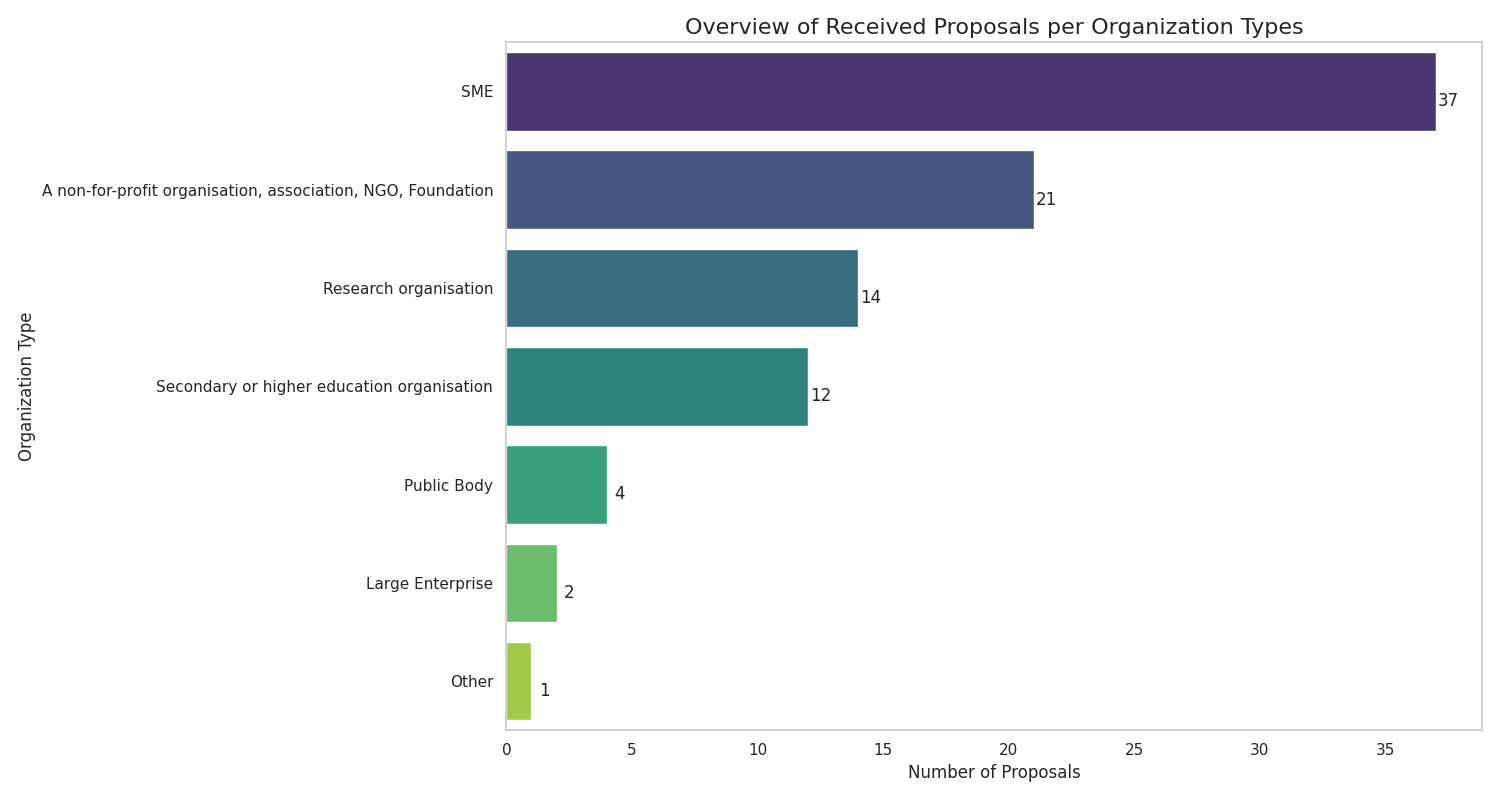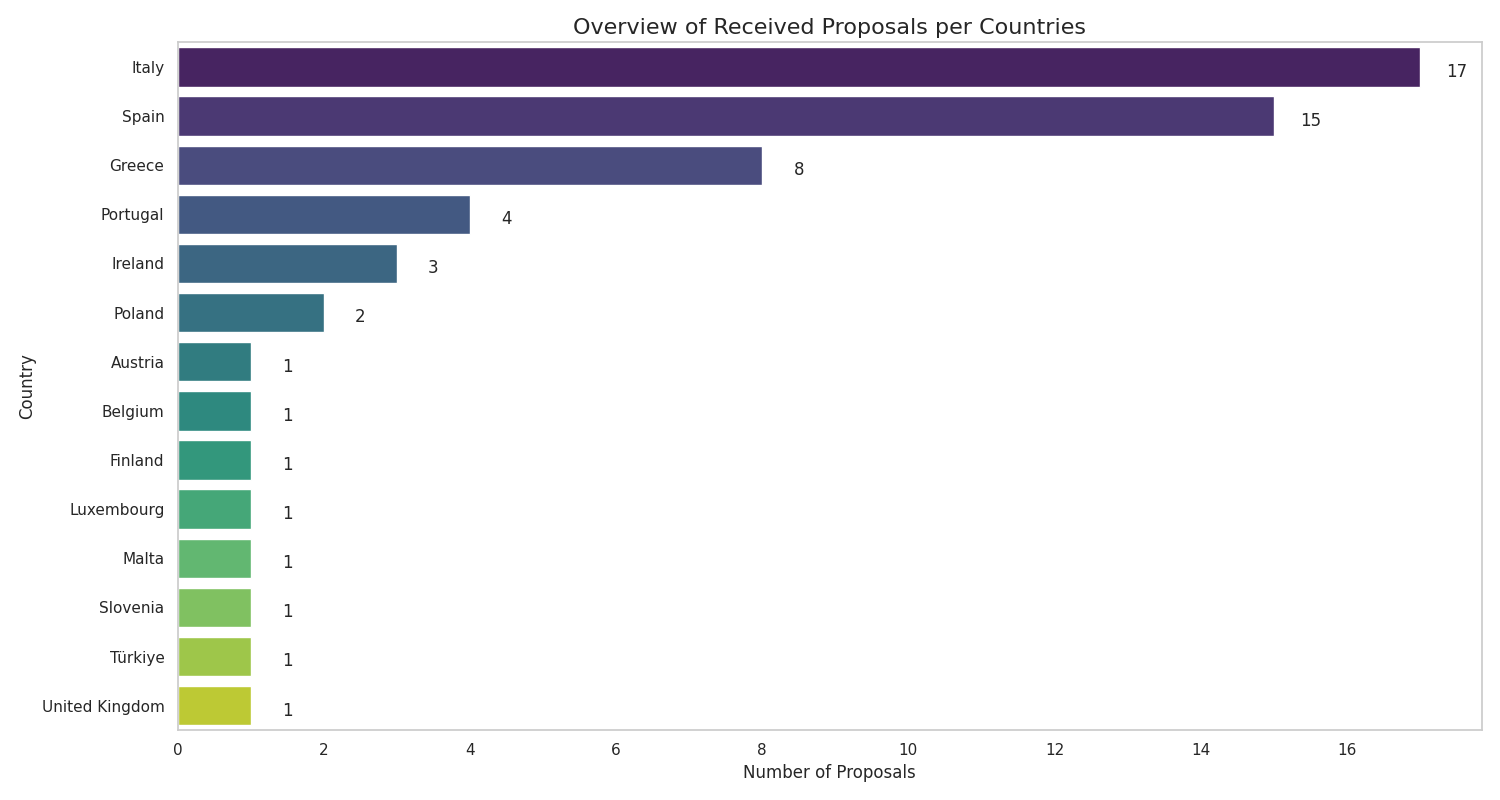Pharaon 2nd open call winners
The Second Pharaon Open Call closed on 30 September 2023. In total, 41 proposals from 14 countries were received on time through the Evalato platform used by our project. 19 of these passed administrative review and were reviewed by the external expert panel. Finally, the 12 best rated proposals became eligible for funding.
| Acronym | Title of proposal | Organisations | Countries |
| MildSIght | MildSight Project | Institute for elderly care and sheltered homes;
Ideable Solutions, SL |
Italy, Spain |
| SAFE-LY | Safety Assistance in Fall Detection and Emergency for Elderly Care | PAL Robotics;
Badalona Assistance Services |
Spain |
| ELIGENCE | Exercise Intelligence – Advanced Cognitive Stimulation Solution for PHARAON | Maggioli SPA;
Athens Association of Alzheimer’s Disease and Related Disorders; “Science for you” PNPC – SciFY |
Italy, Greece |
| BELLIS | Bringing efficiency and safety in elderly homes through holistic digital technologies | Foundation for research and Technology – Hellas;
imaginary srl; Medical University of Lodz |
Greece, Italy, Poland |
| ELISIR | Elderly Lifestyle Innovative monitoring System based on non-IntRusive iot technologies | Department of Engineering for Innovation – Università del Salento;
Consortium Ubiquitous Technologies s.c.a r.l.; Department of Translational Medicine – Università degli Studi di Napoli Federico II |
Italy |
| CHANCE | Cognitive Health Assessment; a Novelty in Care for Elderly | BrainTrip Ltd.;
Science and Research Centre of Koper |
Malta, Slovenia |
| MARISSA | Managing elderly diabetes & associated sarcopenia health | Vidavo S.A.;
National and Kapodistrian University of Athens; Alliance for Integrated Care |
Greece |
| CareBridge | CareBridge | Captain Coach P.C.;
Wita SRL; Aristotle University of Thessaloniki |
Greece, Italy |
| E-MOTIVE | E-MOTIVE: Empowering Mobility with affective cOmputing, brain-computer inTerface, Internet of Things, and Vital signs monitoring for Smart WhEelchairs | Next2u SRL;
University “D’Annunzio” of Chieti-Pescara; Polytechnique University of Marche |
Italy |
| ISABELLA | Iot Support and Assistance for Better Elder Living and Learning Advancement | Italian Association for Spastic Assistance of the Province of Bologna onlus;
ASP City of Bologna – Public company for personal care and welfare; Lepida SCPA |
Italy |
| SIRIUS | Sensorized pad for pressure and proximity monitoring during in-home active aging training activities | Mediate SRL;
Università Campus Bio-Medico di Roma; Fondazione Policlinico Universitario Campus Bio-Medico |
Italy |
| AllevAIt | Alleviating the burden of chronic diseases with an AI-assisted PROMs chatbot | PROMPTLY – Software Solutions for Health Measures, S.A.;
Associação para Investigação e Desenvolvimento da Faculdade de Medicina |
Portugal |
Second Open Call
The Pharaon Project, co-funded by the European Union’s Horizon 2020 research and innovation programme under grant agreement No 857188, will offer financial support to third parties through an open call for contributions to the project. Through the Second Open Call (OC2), Pharaon aims to complete and complement the evolution process of the Pharaon Ecosystem and pursue all key specific objectives of the project. In particular, OC2 aims at: i) expanding the capabilities of the Pharaon ecosystem by bringing new digital solutions and technologies; ii) extending the reach of Pharaon beyond the boundaries of the current pilots by implementing new pilots; iii) demonstrating that the Pharaon interoperability tools provide a robust and easy-to-use framework that will facilitate Pharaon ecosystem evolution and thus its sustainability.
TIMETABLE
| Stages | Date and time or indicative period | |
| a) | Publication of the call | 31.07.2023 |
| b) | Deadline for submitting applications | 30.09.2023, 17:00 CET |
| c) | Info sessions for potential applicants (webinar) | 08. 08. 2023 moved to 29.08.2023 |
| d) | Evaluation period | 30.09.2023 – 15.10.2023 moved to 30. 10. 2023 – 17. 11. 2023 |
| e) | Information to applicants | 16.10.2023 moved to 20. 11. 2023 |
| f) | Signature of Sub-grant agreement | 17.10.2023 – 27.10.2023 moved to 21. 11. 2023 – 30. 11. 2023 |
| g) | Starting date of the action | 01.11.2023 moved to 01. 12. 2023 |
Relevant Information
This Open Call focuses on attracting small consortia consisting of up to 3 partners from the following categories:
- SMEs, and Micro SMEs as defined in the EU: EU recommendation 2003/361, including the UK
- Web entrepreneurs and individual sole-traders;
- Industrial organisations.
- User representative organisations (i.e., social organisations, retirement homes)
- Universities or Research Organisations
- Other eligible organisations with high TRL level activities.
Each partner of the consortia must have a validated Participant Identification Code (PIC) number. Consortia other sizes may be considered. Including at least one SME or Micro SME is recommended. Tentatively, one beneficiary could submit a maximum of 2 proposals, and only one proposal as coordinator. Beneficiaries obtaining the cascade grant through the Pharaon Open Call 1 cannot submit the proposal to this call.
Call opening: 31.07.2023
Deadline: 30.09.2023, 17:00 CET
Project duration: 10 months
Budget: 2.500.000,00 EUR (15 grants of up to EUR 200.000,00 each)
In case of any question please contact the Pharaon Open Call team: opencall@pharaon.eu
1 Pharaon Open Call Text
2 Pharaon Open Call Tech Document
3 Pharaon Proposal Template
3.1 Pharaon Open Call Budget Calculation
4 Pharaon Cascade Grant Agreement
5 Pharaon Reporting Procedures
6 Pharaon Final Monitoring Report
7 Pharaon Continuous Reporting
7.1 Pharaon Continuous Reporting Excel Sheet
8 Pharaon Guide for Applicants
Call for Evaluators
An online seminar was held on August 22 (10:00 - 11:00 CET), 2023 to provide training to evaluators on the details of the call, review process, and evaluation expectations.
1 Call for Evaluators2 Contract for Experts
3 Individual Reviewer Report
Open Call Webinar
Watch our Pharaon Second Open Call – Informative Webinar, held on 29th of August 2023 to learn more about the call, the pilot sites, the platform, and gaps to fill in by potential applicants.
OBJECTIVES
The objectives of the pilot in Murcia are to improve telecare systems in the region, especially by empowering older adults to participate more directly in their care.
The objectives of the Andalusia pilot are focused on addressing unwanted loneliness and social isolation as well supporting wellbeing. Accordingly, the Andalusian pilot developed three use cases related to improving digital skills, community participation and cognitive stimulation.
The objectives of the Slovenian pilot are to reduce social isolation and loneliness, monitor and encourage physical activity, and to monitor and improve indoor environmental quality in retirement homes. Accordingly, the use cases addressed at the Slovenian pilot site focus on improving wellbeing, increasing social involvement and event participation, and supporting communication between peers and family.
The objectives of the Dutch pilot are to promote social cohesion and to reduce social isolation and loneliness by matching people and promoting healthy ageing through lifestyle coaching provided by technological solutions. Accordingly, the two main use cases being demonstrated are related to community building and providing tailored health advice to older adults.
The Italian pilot is split between two locations, Tuscany and Apulia. The primary objective of the Italian pilot is to improve quality of life for older adults living at home. In Tuscany, the priorities are to address socialisation and inclusion, as well as monitoring living conditions. In Apulia, the priorities are to provide physical and cognitive stimulation activities, while also providing solutions for socialisation and environmental monitoring.
The pilot in Portugal is divided between two locations, Amadora and Coimbra. The objectives of the Portuguese pilots are to develop and implement citizen focused solutions, integrated care and planning, integrated infrastructures and processes, and knowledge sharing. These pilots include a central focus on the relationship between the community, the environment, and the people living in them. Accordingly, the use cases addressed by the Pilot sites in Portugal are participation in community life, lifelong learning, and ensuring a safe and comfortable environment.
Could you provide additional information in regards to the Amicare sensors?
- Are the sensors ready for production?
- How do they connect and send the information?
- How do they work, do they use batteries?
- Which are the types of sensors, which ones are available? What is the cost? If we plan to use them, are they an eligible cost?
Answer:
Firstly, the Amicare sensors are handled by the Amicare application and servers, and your technology will interact with the sensors only via the Amicare APIs. The same applies to all PHArA-ON technologies.
Secondly, if you wish to integrate with Amicare or other PHArA-ON technologies, please remember that this is to be done only as part of the optional SA3, which will result in a separate system that is not run in a production environment with real users. For the SA3 integration, you will receive one or two copies of the needed Amicare sensors, but this is for technical testing and not for use in a production environment. If you are interested in using them in a production environment, this would be out of scope of the call.
Amicare sensors (or other PHArA-ON technologies) will be available at the beginning of your project. The Amicare HW device includes the following sensors:
- External sensor mat that can be placed in an armchair or bed for occupancy detection.
- Infrared sensors for movement detection.
- Environmental sensors: temperature, humidity and luminosity.
- External sensor to detect when the fridge is opened and closed.
Since you asked, Amicare sends sensor data through WiFi to a cloud server. It will be provided with no batteries, but with a wall power supply. For additional details, see section 3 of the OC2 technical document. Just to provide a little context, let me clarify that there are two main parts of an application that addresses all SAs:
SA1+SA2:
- These SAs are mandatory and thus common to all applications.
- All proposals should “create a pilot and a real deployment with relevant stakeholders on the basis of the selected PCHs and SAs” (section 2.2 OC2 text).
- Each consortium should provide its own technological solution to address this part and it does not require any integration with PHArA-ON.
- Regarding the evaluation of this part: “Evaluation of the applicant’s technology with respect to SA1 and SA2 will include full deployment of the standalone version of the technology in a care setting and evaluating with real end users.” (Section 3.1 OC2 text)
SA3:
- It is optional.
- It requires integration with 3 PHArA-ON technologies (see section 3.2 OC2 text) and the PHArA-ON Hub (described in the OC2 technical document).
- Evaluation: “For SA3, it involves a primarily technical evaluation of the integrated version of the technology to validate the implemented integration. End user evaluation for SA3 can be limited to only a small usability evaluation with target groups, which does not require a production environment.” (Section 3.1 OC2 text). So, it does not require deployment in the proposal’s pilot, only a technical validation and user evaluation with a small group of users.
In summary, the pilot in the proposal should be built considering SA1 and SA2 and using only its own technological solution (it does not include any PHArA-ON technology). If the proposal addresses SA3, an integration will be done with the goal of demonstrating the merits of the PHArA-ON approach to interoperability. The evaluation of this part will be limited to technical validation and user evaluation with a small group of users.
In regards to the technical integration, we have a platform that will give us the opportunity to cover many aspects included in the challenges (PCH1, PCH3, PCH5, PCH6, PCH10). HOWEVER, AS OUR PLATFORM HAS DIFFERENT MODULES AND IN THE CONTEXT OF THE EXPECTED APPROACH WITHIN THE PROJECT, WE WONDER IF IT MAKES SENSE TO:
- Include the SSO from PHArA-ON to connect all the modules.
- Integrate using PHArA-ON and OpenAPI.
- Use some existing solutions as PACO on tablets with elderly users and Amicare sensors in some cases.
Integrate using PHArA-ON and OpenAPI. Assuming you mean "using the PHArA-ON hub", this is the whole purpose of SA3. You are required to use OpenAPI for your own APIs if they are called by another PHArA-ON component or facility.
Use some existing solutions as PACO on tablets with elderly users and Amicare sensors in some cases. As part of your SA3-specific use case and system description, you should indicate which PHArA-ON technologies are used and how, and which parts are provided by your own technology/technologies. So, you can decide to use the PACO and Amicare technologies if these fit your envisioned use case.
Should the pilot study be held in one of the 6 Pharaon pilot sites mentioned in the guidelines?
You should have your own pilot that you include in the proposal and not plan to involve Pharaon pilots.
Where are the pilots to be deployed? Is integration with Pharaon technologies required?
Each proposal should “create a pilot and a real deployment with relevant stakeholders on the basis of the selected PCHs and SAs” (section 2.2 OC2 text). Applicants should be using their own technology and recruiting their own users. This OC2 pilot will be separate from Pharaon pilots, and thus, no users of current Pharaon pilots will be part of the OC2 (Open Call 2) project.
The pilot can be deployed in any EU country, with no budget limitation per region.
Only if SA3 is addressed, integration with 3 Pharaon technologies is required (see section 3.2 OC2 text) and the Pharaon Hub (described in the OC2 technical document). For the Slovenian pilot, the available technologies are Sentab, IoTool (Senlab) and Discovery (Ascora). These technologies are described in the OC2 technical document.
Is the maximum funding set at €200,000 per participant in the consortium?
No, the whole consortium together can request up to 200.000,00 EUR.
Is it possible to apply with our company registration number or our tax registration number instead of the VAT number?
Yes, you can apply with tax registration. However, see the request of validated PIC number.
As winners of the first open call, are we eligible for the second open call or are there restrictions?
As it is written in the call text, beneficiaries of Open Call 1 are not eligible to apply (see page 19 of the call)
If we want to address the SA3, in addition to the digital solution adaptation is it mandatory to select at least 3 Pharaon Technologies in our pilots? If yes, does these technologies need to be integrated in our digital solution? Where do we find the list of technologies, and how we could know if these technologies are translated in our local languages?
For the mandatory part, addressing SA1 and SA2, you must build your own pilot with your own solutions and own users. This pilot will be completely independent from Pharaon, but it has to address the defined Pharaon Challenges (PCHs). Validation of this part “will include full deployment of the standalone version of the technology in a care setting and evaluating with real end users”. See section 2.2 in the OC2 text.
SA3 runs independently from the abovementioned pilot with users, but no deployment of this part is expected. Integration with 3 Pharaon technologies is required by the use of the Pharaon Hub (described in the OC2 technical document).
Regarding its validation: “… it involves a primarily technical evaluation of the integrated version of the technology to validate the implemented integration. End user evaluation for SA3 can be limited to only a small usability evaluation with target groups, which does not require a production environment.” (Section 3.1 OC2 text). So, it does not require deployment in the proposal’s pilot, only a technical validation and user evaluation with a small group of users.
Where can I find a list of available technologies? Are the Pharaon Platform listed in pharaon.eu/about/technologies considered technologies that could be integrated? Will be all the physical devices proposed by the digital solutions listed eventually be available for testing?
Proposals should refer to the list of available technologies for the Second Open Call (OC2) in the Technical Document (section 3). Please, note that Pharaon platforms are not included.
After OC2 evaluation process is over, there will be some other Pharon technologies available. These technologies will be presented to the selected winner consortiums, who can then change their initial selection.
If any of the Pharaon technologies chosen by the applicant consortium includes HW devices, at least two devices will be made available for testing. Please, note that addressing SA3 only implies a technical evaluation and does not require a production environment. There will be end user usability evaluation, but only with a small target group.
Unlike the full pilot addressing SA1 and SA2, SA3 does not require deployment in the proposal’s pilot, only a technical validation and user evaluation with a small group of users.
Is a PIC number required?
The call text is clear, that the validated PIC number is required. No exceptions will be made.
Is it right that we should bring in our own technology and test that in SA1 and SA2?
Yes, this is correct. You should use your own technology.
Is it advisable to apply with 4 partners (1 user, 3 tech) although your rules state otherwise? Or should we take one of the tech partners on board as a subcontractor?
The OC2 text on page 19 states:” Consortia other sizes may be considered. Including at least one SME or Micro SME is recommended.”
Would it be possible to receive more specific information about the expected impacts?
Sections 2.2 and 3.1 in OC2 text include the main elements of what would be considered for evaluation.
Is it possible to submit more than one proposal as partner?
You can submit 2, if you coordinate one. You can’t submit in any case more than 2 proposals.





